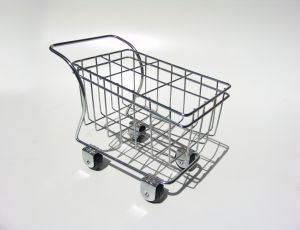Amazon Stores or Amazon Review Blogs?
Why are people finding more success by promoting Amazon with stores instead of blogs? Read on to find out and learn a few tricks you most likely didn’t know…
I often see a debate on the merits of using a blog to promote Amazon versus a Store. Personally I think either method can work fine (providing you do it right) although I will list here the reasons why I always get more success with stores instead of blogs.
The Cookie
People will often talk about the 24 hour Amazon Cookie and for some it is enough to stop promoting Amazon altogether. When you compare it to other merchants it does seem grossly unfair.. but personally I understand why they do it. Anyway, there is a way around this that many people don’t realise; using a store (with a Remote Shopping Cart) will give you a “cookie” that lasts up to 90 days.
What is a Remote Shopping Cart? This is where the visitor can add a product to their basket on your store and when they click “Proceed to Checkout” they are redirected to Amazon, and the contents of their cart are merged into Amazons cart. FreshStore has this functionality.
Once the visitor has done this, the product will stay in the users cart for up to 90 days. Even better; if the person visits Amazon again the 90 day period is reset. So when they finally check out and purchase that product you still get credit for that product.
Conversion Rates
Using a blog format is a tricky thing to get right in terms of conversions, as the best method is to offer product reviews. This can be good or bad depending on the niche and it is hard to find out without diving in and creating your site. For example, creating a site that reviews beds would get a lot of visits but then people would most likely just read the review and then want to try the bed in “The Real World(tm)”
Some niches are not so obvious, but what I have noticed is that stores have higher conversion rates and lower bounce rates. When someone visits a store they are typically looking to buy and if they see a good price they will do. And Amazon is great at offering good prices.
Bounce Rates
I have explored in depth the Thin Affiliate Penalty issued by Google to some affiliate websites. In a nutshell – this is a permanent penalty that drops your site -50 places for every search term. I personally believe it is issued manually and my further research indicates that the bounce rate is a big factor.
This is my theory, which obviously can’t be proved but is my educated guess. Google knows how much traffic they are sending to your site and they also know how quickly people are returning from your site back to Google. If your site has a high bounce rate (70%+) it is flagged for a manual inspection. If this happens a Google employee quickly checks the site for a few key factors and then decides whether or not to apply the penalty.
I have found stores always have a lower bounce rate as the visitors are encouraged to visit other pages, see other products and typically they find a price they want and checkout. With a blog review site they are more likely to read it and click back without any incentive to continue.
Bigger Baskets
A smaller but significant point is that in a store scenario it is easier to upsell the customer to buy more products. They can add multiple products to their basket and this increases overall commissions.
Better Organised Products
With a blog format it is typically a bit more difficult to organise larger amounts of products. When you have a store, categories, sub categories, special offer sections etc. allow you to present products in different ways to the customer. Overall larger amounts of products are more accessible and this in turn leads to lower bounce rates and higher conversions.
In a blog format your blog posts are time sensitive. After they are published Google assumes they are going to get out of date as time goes on. Obviously this shouldn’t apply to a product review but this is how a blog works in the traditional sense.
Standalone System
With a store system you are using technology that is designed exactly for that purpose. A blog system has been designed for another reason and typically you install plugins to modify behaviour etc. In my experience this increases the time and complexity of setting up your blog and leads to future upgrade problems.
SEO Benefits
Having a store structure allows Google to easily identify “Product Info” pages i.e. the pages with all the information on your products. Google have always stressed the importance of good structure (see Better Organised Products) and the “Category -> Sub Category -> Product” hierarchy allows them to correctly identify pages. This is why in a store format product pages will rank well for long tail keywords with little or no SEO work.
Conclusion
Overall this does not mean that blog review sites can not succeed or be profitable, although in my opinion you stand a better chance using a store format.
What do you think? What are your experiences? Comment below and let me know which format you prefer!